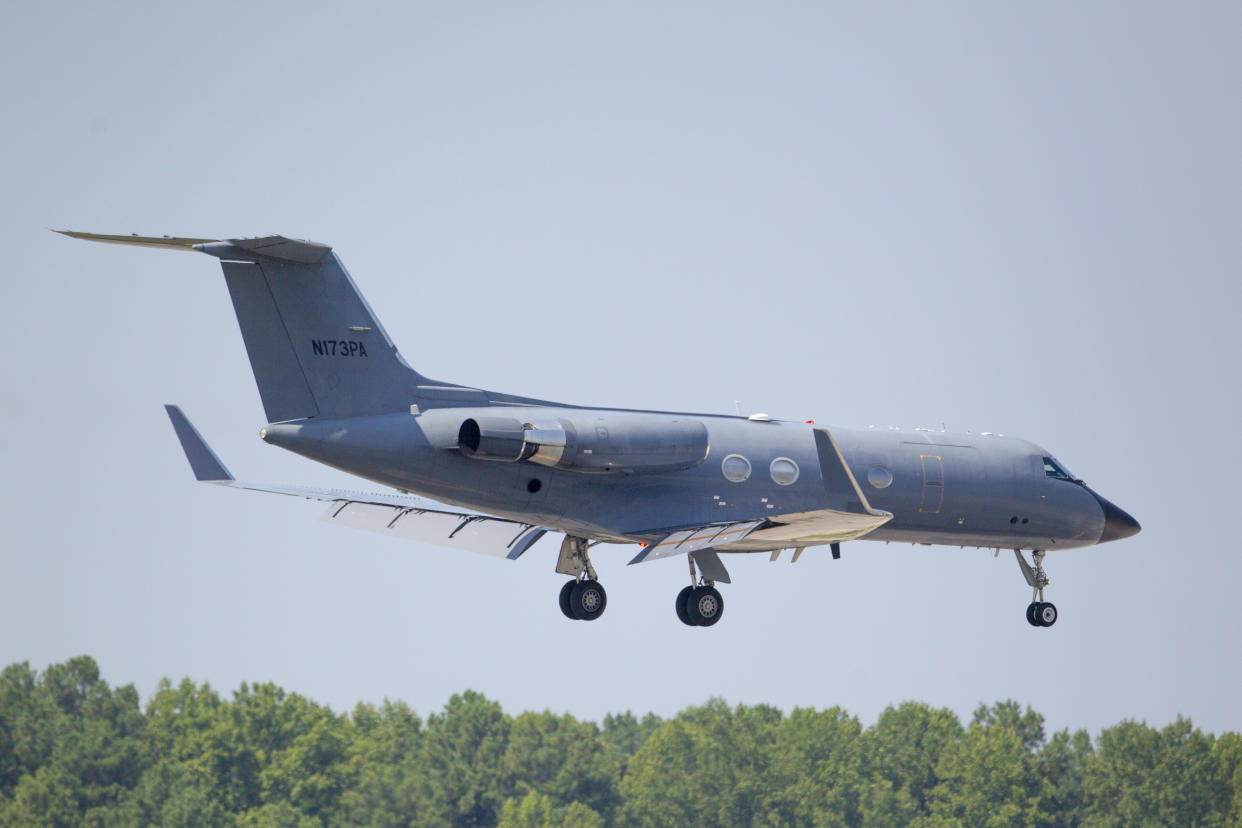State Dept. rewards ‘Ebola plane’ company with multimillion dollar raise
Deal worth up to $25 million also calls for private firm to educate the government on preparedness

On an unusually cold morning in northwest Georgia last month, Ebola survivor Nancy Writebol pulled up to the private aviation company Phoenix Air with five dozen Krispy Kreme doughnuts.
Her mission: to meet and thank the people who accomplished her elaborate air medical rescue from West Africa last summer — a feat that helped save the aid worker’s life.
“Their care and evacuation was an important part,” Writebol, 59, told Yahoo News. “It’s important to express gratitude. I’m just thankful for people who have been involved in the situation.”

She is one of 25 people, who were either stricken with Ebola or exposed to the deadly virus, who Phoenix Air has transported — to the U.S. or other countries — at the State Department’s request since early August.
Writebol showed her appreciation with sweets and hugs. The State Department, however, is rewarding the flight company’s heroics with a raise.
The new deal worth $12.5 to $25 million begins Saturday and puts Phoenix Air on 24/7 standby for another year. The company has two distinctive jets tailored to carry a special isolation chamber for transporting highly contagious patients.
Unlike the previous six-month contract, which ended up totaling $9.5 million, this agreement also calls on the aviation firm to share some of its operations knowledge and engineering expertise by helping the government get up to speed through training and development.
In justifying the contract, the State Department writes that it has identified a support gap in its mission to respond to critical threats overseas.
“This gap includes air mission planning, movement of emergency response personnel into and out of hazardous or non-permissive environments and medical evacuation of critically ill patients, including patients infected with unique and high contagious pathogens,” the State Department contract specifies.
U.S. officials were caught off guard last summer as the Ebola epidemic, which has killed nearly 9,000 people globally, raged in West Africa and American aid workers needed evacuating.
“The Centers for Disease Control [and Prevention], Department of Defense, and other government agencies have deployed crisis response teams that currently have no contingency plan for evacuation,” the State Department wrote in justifying an emergency contract with Phoenix Air last August.
The U.S. attempts to recoup some of the expense by asking sposoring humanitarian agencies or foreign governments to pay the estimated $215,000 it costs to evacuate someone from West Africa.
Phoenix Air, whose work ranges from executive charters to military training to aircraft modifications, never intended to be the go-to source for epidemic evacuations. From 2005 to 2010, it was contracted to transport the CDC’s employees in emergencies. During that time, the health agency inquired about ways to bring home personnel infected with an airborne virus if ever needed.
With the help of the DOD and Phoenix Air, the CDC engineered a negative-pressure, tent-like structure that allows caregivers to treat a single patient in flight without infectious germs escaping. But the Aeromedical Biological Containment System (ABCS) was specifically designed and FAA-approved for a “special mission” Gulfstream III — which the CDC was leasing from Phoenix Air at the time. There are only three such jets in the world, and Phoenix Air owns them all.
With the SARS (severe acute respiratory syndrome) scare over, the CDC asked Phoenix Air to shelve the unused system in 2011. It remained in storage until Writebol and Dr. Kent Brantly fell ill — and a doctor at the State Department remembered its existence.
Since then, the “Ebola plane” has ferried humanitarian workers to specialty hospitals in Omaha, Atlanta and Bethesda, Maryland. Phoenix Air was the only option in the world for a biocontainment evacuation until the DOD announced last week that its “Transport Isolation System” — a larger version of the ABCS capable of carrying four people — is ready for action.
“Phoenix Air management was very gratified to hear that,” Dent Thompson, the carrier’s vice president of operations, told Yahoo News.
The DOD’s design is the size of a minivan and made for a C-17 or C-130 transport aircraft. Three isolation systems are now staged at Joint Base Charleston Air Force Base in South Carolina in the event that one of 1,500 military personnel fighting Ebola in Africa gets the virus.

Because of its obligation to protect U.S. employees in embassies, consulates and on assignment worldwide, the State Department contract specifies that its rescue plane “requires a very unique combination of aircraft specifications and capacity.”
The State Department writes that it is working with the FAA and private industry to “foster new engineering solutions.” But with testing and certifications likely to take at least two years, the new agreement with Phoenix Air includes options to renew until February 2018.
“The pressure on our company has been enormous to react to the demand for it,” Thompson said.
But he said the carrier’s 150 employees realize it would “morally reprehensible” for them to back away now.
“We would never in a million years do that,” Thompson said. “As dumb as it sounds, we have an obligation to humanity to continue to do this until other people develop a capability.”
These are comforting words for Writebol and her husband, David. The couple, missionaries for the Christian outreach SIM USA, will return to Liberia this spring.
“It doesn’t matter if it’s a missionary or an aid worker or our service members, it’s important that we be able to care for people the best way that we can,” Writebol said.
Editor’s note: Some of the numbers in this story have been updated. Despite multiple requests over two days, the State Department responded to questions after the story originally published.
Jason Sickles is a reporter for Yahoo News. Follow him on Twitter (@jasonsickles).



